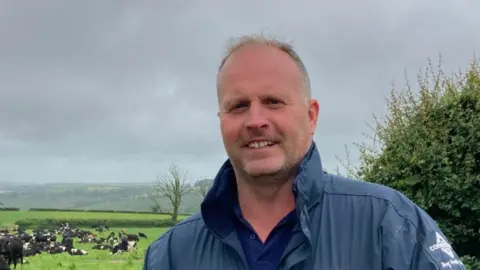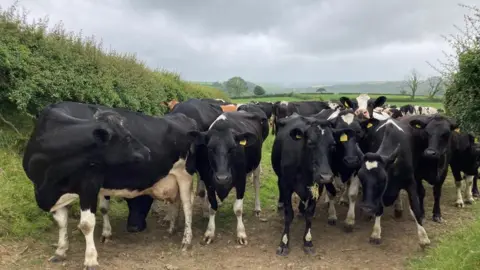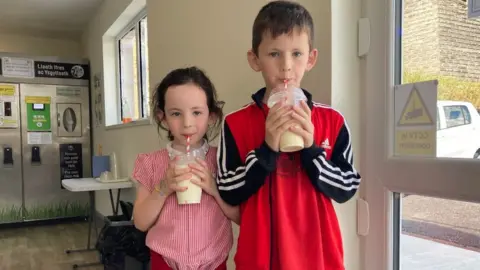Dairy farming: Farmer's pain at TB loss of 500 cow herd
 BBC
BBCA farmer has spoken about the toll on him and his family after losing his entire dairy herd of 500 to bovine tuberculosis (TB).
Gwyndaf Thomas, who farms near Meidrim in Carmarthenshire, has had to rebuild his farm after the loss five years ago.
He now milks 260 cows but said the Welsh government had to do more.
The Welsh government called TB a "huge challenge" but said there had been "good progress" since establishing the TB eradication programme in Wales.
Bovine TB is mainly a respiratory disease and can be passed between infected cattle, and there is a risk people can also catch it.
"Within six months, the entire herd was cleared off the farm and there's nothing worse than seeing a dairy farm sat empty," said Mr Thomas.
"It was a very difficult time and for the children as well. I remember the youngest girl here crying at night wondering what was going to happen to the pet dog and the pet cat.
 Gwyndaf Thomas
Gwyndaf Thomas"And then having to go to the hospital... to have their BCG vaccination (used against TB), which I was unaware of at the time, but they stopped doing BCG injections for school kids many years ago."
He described his children feeling like "outcasts" at school when classmates asked what the marks on their shoulders from the jabs were, and after turning to a local MP for help, getting only an offer to use a food bank for three weeks.
'Shambles'
"It was just pathetic to be honest," he said.
Mr Thomas described the Welsh government's approach to trying to eradicate TB in Wales as "a shambles".
A Welsh government spokesman said: "TB in cattle is a huge challenge, and distressing for farmers who have to deal with it in their herds.
"We have seen good progress since our TB eradication programme was first established, with long-term decreases in incidence and prevalence.
"Part of the solution to the problem is the willingness of people, both in government and the industry, to work together. Farmers are at the centre of what we're trying to achieve and we are, of course, listening to them.
"We have been clear we can't tackle this disease alone and we all have an important role to play."

Welsh government figures show a decline in dairy farms from 3,372 in 2010 to 2,495 in 2020 - a fall of 877. But over the same period the average size of the dairy herd has increased from 66 to 101.
The price of milk has also been frustrating for many dairy farmers for the past few years.
Although the price has increased significantly recently, the increase in feed, fertiliser and energy costs has had a significant immediate impact on dairy farmers.
Cutting out the middle man
Dairy farmers are still projected to make a loss of 0.3p per litre for the price of milk they are getting from big suppliers.
It has led to some in the industry taking things into their own hands and cutting out the middle man.

At his farm on the outskirts of Carmarthen, near Nantgaredig, Mathew Jones has just opened a new milk vending machine.
"It's proving very popular so far and we're still getting new customers through the door, which is nice to see," he said.
'We're still in the same boat'
"Something needed to be done, unfortunately with the prices of energy, feed, fuel going up.
"The price of milk has risen with it but we're still in the same boat, we're not gaining anything.
"We needed to do something different, because we were getting up every morning, milking the cows, doing the same routine and getting the same outcome. Hopefully it will secure a bit of extra income at the end of the year."

He added it was "no great shock" to hear of the decline in dairy farms and he could see "a lot more leaving the industry".
"You only have to look on Facebook and see all over the country, there are two or three dispersal sales each week. So it is a concern," he added.
Referring to the support currently available for farmers in Wales, a Welsh government spokesman said: "We are committed to continuing to support the Welsh dairy industry to ensure it has a strong future.
"We have provided £6.5m funding from the Rural Development Programme to support the Agriculture and Horticulture Development Board's Dairy Improvement Programme to increase efficiency and resilience of the dairy sector.
"Although there has been a reduction in the number of dairy farms, this has not been matched by the number of dairy cows in Wales."
